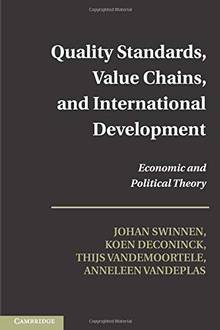Quality Standards, Value Chains, and International Development: Economic and Political Theory
Johan Swinnen, Koen Deconinck, Thijs Vandemoortele, Anneleen Vandeplas
Éditeur : CAMBRIDGE UNIVERSITY PRESS
ISBN papier: 9781107688865
Parution : 2015
Code produit : 1307973
Catégorisation :
Livres /
Gestion /
Économie /
Politiques économiques
Formats disponibles
| Format | Qté. disp. | Prix* | Commander |
|---|---|---|---|
| Livre papier | En rupture de stock** |
Prix membre : 45,38 $ Prix non-membre : 47,77 $ |
*Les prix sont en dollars canadien. Taxes et frais de livraison en sus.
**Ce produits est en rupture de stock mais sera expédié dès qu'ils sera disponible.
Description
Over the past decades, the world has witnessed an unprecedented growth in global value chains, propelled by increasingly demanding quality standards. These trends lead to concerns about the impact of value chains on development and poverty and about the possible protectionist nature of quality standards in rich countries. This book offers the first integrated theoretical analysis of the economic and political factors which determine the level of quality standards, as well as their economic effects along the value chain. Using realistic assumptions motivated by empirical research, the theoretical framework in this book makes it possible to study the efficiency effects as well as the distributional consequences of one of the most striking evolutions affecting global trade and development today.























